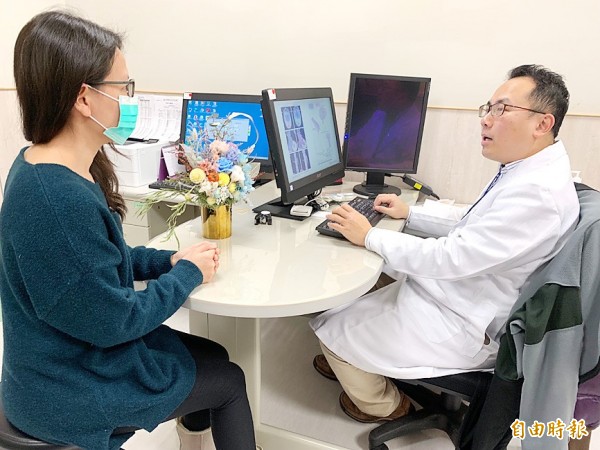《TAIPEI TIMES》 PTSD heightens risk of chronic illnesses: research

Psychiatrist Chou Po-han, right, talks to a patient at China Medical University Hospital’s Hsinchu Branch in an undated photograph. Photo: Liao Hsueh-ju, Taipei Times
By Liao Hsueh-ju and Jonathan Chin / Staff reporter, with staff writer
Post traumatic stress disorder (PTSD) multiplies the risks of developing hypertension, diabetes and dyslipidemia by a factor of four to six, psychiatrist Chou Po-han (周伯翰) said yesterday.
A study that he was a part of showed a strong link between PTSD and metabolic syndrome later in life, said Chou, who works at China Medical University Hospital’s Hsinchu Branch.
The study, a collaboration between China Medical University, Harvard University, Taipei Tzu Chi Hospital and Tri-Service General Hospital, tracked the health of 4,765 people in Taiwan over 13 years, including 935 people diagnosed with PTSD and 3,812 people without it, he said.
The findings showed that PTSD increased the probability of developing high blood pressure, blood lipids or diabetes by four to six times, he said.
Risks of metabolic syndrome are heightened by chronic PTSD, because the condition affects the amygdala, which regulates emotional responses, including the fight-or-flight response, he said.
Long-term PTSD causes the amygdala to become overactive, which puts the sympathetic nervous system into overdrive and triggers bone marrow secretions of vascular inflammatory markers, leading to metabolic and vascular stress, he said.
Antidepressants were associated with decreased risks of metabolic syndromes, suggesting that the medication’s effect on halting amygdala overactivity could explain its anti-inflammatory properties identified by previous research, he said.
PTSD is the product of traumatic events that exceeds a person’s ability to withstand distress and the condition causes panic attacks, anxiety and depression, he said.
The research has been published in the March-April issue of General Hospital Psychiatry
新聞來源:TAIPEI TIMES
%http://www.taipeitimes.com/



















